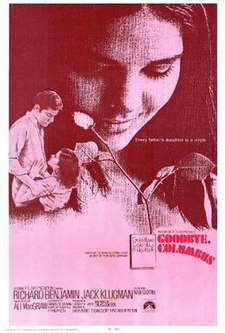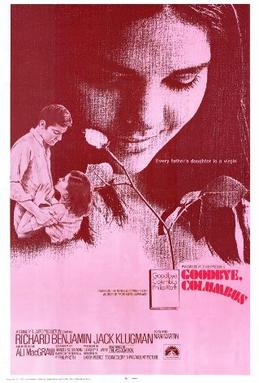Goodbye, Columbus is a 1959 collection of fiction by the American novelist Philip Roth, comprising the title novella "Goodbye, Columbus"â€"which first appeared in The Paris Reviewâ€"and five short stories. It was his first book and was published by Houghton Mifflin.
In addition to the title novella, set in New Jersey, Goodbye, Columbus contains the five short stories "The Conversion of the Jews," "Defender of the Faith," "Epstein," "You Can't Tell a Man by the Song He Sings," and "Eli, the Fanatic." Each story deals with the concerns of second and third-generation assimilated American Jews as they leave the ethnic ghettos of their parents and grandparents and go on to college, to white-collar professions, and to life in the suburbs.
The book was a critical success for Roth and won the 1960 U.S. National Book Award for Fiction That earned his name as an up-and-coming young writer. The book was not without controversy, as people within the Jewish community took issue with Roth's less than flattering portrayal of some characters. The short story Defender of the Faith, about a Jewish sergeant who is exploited by three shirking, coreligionist draftees, drew particular ire. When Roth in 1962 appeared on a panel alongside the distinguished black novelist Ralph Ellison to discuss minority representation in literature, the questions directed at him became denunciations. Many accused Roth of being a self-hating Jew, a label that stuck with him for years. It is often speculated that the obscene comedy of Portnoy's Complaint (1969) was Roth's defiant reply to early Jewish critics.
The title novella was made into the 1969 film Goodbye, Columbus, starring Ali MacGraw and Richard Benjamin.
Novella

The title story of the collection, Goodbye, Columbus, was an irreverent look at the life of middle-class Jewish Americans, satirizing, according to one reviewer, their "complacency, parochialism, and materialism". It was controversial with reviewers, who were highly polarized in their judgments.
The story is told by the narrator, Neil Klugman, who is working in a low-paying position in the Newark Public Library. He lives with his Aunt Gladys and Uncle Max in a working-class neighborhood of Newark, New Jersey. One summer, Neil meets and falls for Brenda Patimkin, a student at Radcliffe College who is from a wealthy family living in the affluent suburb of Short Hills. The novella explores the classism which afflicts the relationship, despite the fact that Brenda's father, Ben, came from the same environment as Neil. The issue of assimilation is intrinsic, since Brenda is more assimilated than Neil. The title, Goodbye, Columbus refers to a record that Brenda's brother Ron listens to from his years as an athlete at The Ohio State University, further proof of the Patimkins' success at assimilation. As the story proceeds, Neil finds that their relationship is falling apart. Thus, the title may be seen as a metaphor for Neil saying goodbye to the affluent, assimilated world of the Patimkins.
Composition

Roth wrote in the preface to the book's 30th anniversary edition, "With clarity and with crudeness, and a great deal of exuberance, the embryonic writer who was me wrote these stories in his early 20's, while he was a graduate student at the University of Chicago, a soldier stationed in New Jersey and Washington, and a novice English instructor back at Chicago following his Army discharge...In the beginning it amazed him that any literate audience could seriously be interested in his story of tribal secrets, in what he knew, as a child of his neighborhood, about the rites and taboos of his clanâ€"about their aversions, their aspirations, their fears of deviance and defection, their embarrassments and ideas of success."
The short stories

"The Conversion of the Jews"
Ozzie Freedman, a Jewish-American boy about thirteen years old, confronts his Hebrew school teacher, Rabbi Binder, with challenging questions: especially, whether it is possible that God gave the Virgin Mary a child without having intercourse. Ozzie's mother, though she loves her son dearly, is a more conventional thinker and can't understand why Ozzie courts trouble at school for posing such unorthodox queries. During an argument, she slaps him across the face. Back at school, Rabbi Binder interprets Ozzie's question about the virgin birth as insubordinate, though Ozzie sincerely wishes to better understand God and his faith. When Ozzie continues to ask challenging questions, Binder too slaps him on the face, accidentally bloodying Ozzie's nose. (Interestingly, a nearly identical episode occurs in Mordecai Richler's Son of A Smaller Hero, another North American-Jewish author to whose work many comparisons with Roth's have been madeâ€"most notably, in the alienation experienced by the assimilated Jew, no longer a member of his original ethnic, religious community, yet also not accepted into the larger culture.) Ozzie calls Binder a bastard and, without thinking, runs to the roof of the synagogue. Once there, Ozzie threatens to jump.
The rabbi and pupils go out to watch Ozzie from the pavement and try to convince him not to leap. Ozzie's mother arrives. Ozzie threatens to jump unless they all bow on their knees in the Christian tradition and admit that God can make a virgin birth, and furthermore, that they believe in Jesus Christ; he then admonishes all those present that they should never "hit anyone about God". He finally ends by jumping off the roof onto a glowing yellow net held by firemen.
"Defender of the Faith"
The storyâ€"originally published in The New Yorkerâ€"deals with a Jewish American army sergeant who resists the attempted manipulation of a fellow Jew to exploit their mutual ethnicity to receive special favors. The story caused consternation among Jewish readers and religious groups, as recounted in chapter five of Roth's 1988 memoir The Facts: A Novelist's Autobiography.
"Epstein"
The title character goes through a crisis, feeling at age fifty-nine that by accepting the responsibilities of business, marriage, and parenthood, he has missed out on life, and starts an affair with another woman.
"You Can't Tell a Man by the Song He Sings"
An unnamed narrator recalls the events surrounding his meeting Alberto Pelagutti, a troublemaker, in high school.
"Eli, the Fanatic"
The assimilated Jews of a small community express fear that their peaceful coexistence with the Gentiles will be disturbed by the establishment of an Orthodox yeshiva in their neighborhood.
References

- Notes
- Bibliography
- Brauner, David (1969) Getting in Your Retaliation First: Narrative Strategies in Portnoy's Complaint in Royal, Derek Parker (2005) Philip Roth: new perspectives on an American author, chapter 3
External links

- Philip Roth on the 30th Anniversary of Goodbye, Columbus
- "Goodbye, Columbus: Roth's portrait of the narcissist as a young man"
